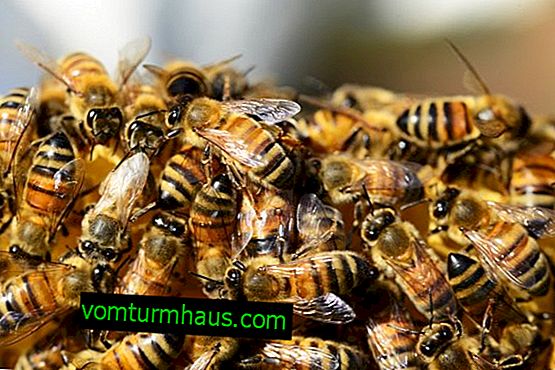Diarrhea in piglets: the main reasons how and how to treat young animals and adults
Veterinarians attribute pig diarrhea to alarming symptoms, as it signals an infection or virus in the animal’s body. Diarrhea occurs in pigs of any age, but is dangerous for babies, as their body is still weak and the immune system has not formed. Therefore, it is important to monitor the condition of young individuals from the moment they are born. The causes of the disease and methods of dealing with it will be discussed in the article.
Reasons for the appearance
Normally, solid excrement in small and adult pigs is of medium consistency. Their liquefaction indicates the presence of diarrhea. It is easy to detect: defecation is uncontrolled, it happens more than 5 times a day. Gastrointestinal problems and other causes can provoke such a bowel movement. Why there is diarrhea in pigs, we will tell further.
Did you know? Pigs do not know how to regulate body temperature with the help of perspiration (they have a tiny amount of sweat glands). Therefore, in order to cool, they are forced to fall out in liquid mud.
In adults
Common causes of liquid excrement include:
- poor maintenance (non-compliance with sanitary and hygienic conditions, inadequate care of livestock);
- water (drinking dirty, stale, low-quality liquids, dirty drinkers);
- intestinal parasites (pig helminths can easily “pick up” on a walk);
- infections, viruses, bacterial ailments ;
- stress (change of diet, place of residence);
- poisoning (ingestion of chemicals, poisonous plants, stale products);
- food (the use of low-quality products);
- violation of metabolic processes (irregular feeding leads to the fact that the animal is starving or overeating, as a result of a malfunction of the digestive system);
- overheating (sunstroke).

In piglets
Most of the reasons mentioned can cause loose stools in young animals, but there are other reasons. About them - further.
Also learn how to treat worms in pigs and piglets.
Newborn
Uncontrolled bowel movements are dangerous for newborn piglets. Their immunity is still being formed, so the body can not cope with the disease. A sick animal instantly dies. Neonatal diarrhea occurs more often due to an infection that is transmitted to babies from the mother during pregnancy or while feeding.
Sosunov
The cause of diarrhea in suckling piglets can also be an infection present in the sow at the stage when the mother's body has not yet developed antibodies. Also provoke liquefaction of excrement in 10-day-old animals is capable of poor living conditions (being in a cold room) and overfeeding.

Senior
In a young growth (1-2 months old), young diarrhea is a frequent occurrence. He appears due to the fact that pigs are very fond of eating and are rarely whimsical to food. Uncontrolled eating leads to overeating and disruption of the intestines.
Also, a malfunction of the organ causes an unbalanced diet and the presence in the menu of products with which the young stomach is not yet able to cope.
Why is diarrhea dangerous?
Diarrhea quickly causes dehydration and leads to loss of nutrients. In addition, it signals a serious problem. To understand what happened to the animals, you need to study the color of the excrement.
Important! Rapid dehydration of the body leads to the fact that piglets weaken, lose their appetite, their body is exhausted. Therefore, treatment is carried out immediately.
- Green with yellow (food is not digested and immediately goes outside);
- White (liver problems);
- Gray (malfunction of the intestine);
- Foamy (there are parasites in the body or it was attacked by a virus);
- Black, red, bloody (bleeding in the digestive system);
- With blood and mucus (dysentery).

First aid
First of all, if you find problems with defecation in a piglet, you need to make up for the deficiency of fluid, salts and minerals in the body, which leads to mortality of young animals. Therefore, during the first 12 hours, it is important to water patients with saline (1 tbsp. Per 1 glass of water) in order to avoid dehydration.
If the situation is critical, it is necessary to introduce sodium chloride (0.9% solution) and calcium chloride (10% solution) intravenously. Lost fluid removes glucose from the body, without which the brain does not receive the necessary amount of nutrients.
Therefore, they give a 40% glucose solution in a dosage of 5-10 ml with an interval of 4-6 hours. It can be administered intramuscularly or under the skin (15-25% glucose solution).
What to do and how to treat diarrhea at home?
The problem must be dealt with immediately as soon as it is discovered. Together with first aid, sick animals are isolated, transferred to a diet, and provide them with comfortable living conditions. Next, they begin treatment with medicines or folk remedies.
It will be useful for you to find out what are and how to choose growth stimulants for pigs, what temperature is considered normal in pigs, how to find out the weight of a pig, and also how many years pigs live at home and in the wild.
Pharmacy drugs
Among the medicines for the fight against diarrhea often used:
- Brovaseptol (powder): 300-350 g / 100 kg of feed. Give for three to five days.
- Brovoform (powder): 2 kg / t of feed or 1 kg / t of water. The duration of treatment is similar to the previous drug.
- "Biovit" (with vitamins and minerals): 1.5 g / kg of weight (for individuals under the age of 10 days), 3-6 g / kg of weight (at the age of 1-2 months), 15 g / kg of weight (four months) . The drug is given once a day for seven days.
- Ditrim (intramuscular injection): 1 ml / 10 kg of weight once a day. If the disease is severe, it is necessary to inject the drug twice a day with an interval of 12 hours. Dosage - 5 ml / 10 kg of weight. The duration of treatment is three to seven days.

Folk remedies
Effective in the fight against diarrhea decoctions and infusions, talkers and tinctures.
Here's what you can drink young:
- Chamomile infusion (20 g / 500 ml of boiling water, insist or boil, give four times a day before meals).
- Decoction of oak root (20 g / 500 ml of water, boil until dark, give 5 ml / kg of weight three times a day on an empty stomach).
- Dioica nettle infusion (20 g / 500 ml of boiling water, insist, give 5 ml / kg of weight four times a day on an empty stomach).
- Coniferous extract (purchased at a pharmacy, given from a spoon or syringe, 2 ml of each individual three times a day for five days).
- Rice talker (10 l / kg of water, boil, cool, strain, give liquid three times a day, 100 g each).
Important! Diarrhea in young animals at the initial stage is best treated with folk remedies, since they gently affect the young body. If the situation is neglected, then antibiotics and other medications cannot be dispensed with.
Care and feeding of piglets during illness
As already mentioned, a sick animal must be isolated. It is placed in a warm room without drafts on a dry litter. Change it, as well as clean the paddock, and ventilate the room twice a day. A sick individual is prescribed a diet.

Additional measures and prevention
To prevent the occurrence of diarrhea, you need to:
- Freshly born piglets should be drunk with boiled warm water with potassium permanganate diluted in it (pale pink).
- Vaccinate sows from E. coli.
- Feed animals clockwise and balanced.
- Enter only fresh and high-quality products on the menu.
- Add a new product to the menu gradually.
- Be sure to introduce vitamin-mineral complexes into the diet.
- Grind food well and mix.
- Observe sanitary and hygienic rules for the care and maintenance of animals (monitor dryness, cleanliness and comfortable temperature).
- Clean feeders and drinking bowls regularly.
- Control the animals for a walk so that they do not eat too much.
- Carry out timely deworming and vaccination.
Did you know? Pig pancreatic secretions produce insulin.
Diarrhea in piglets is an unpleasant and dangerous phenomenon that is not easy to cope with. Therefore, it is necessary to carefully study the causes of its appearance and methods of struggle in order to come to the aid of the animal in time and prevent complications of the situation.



